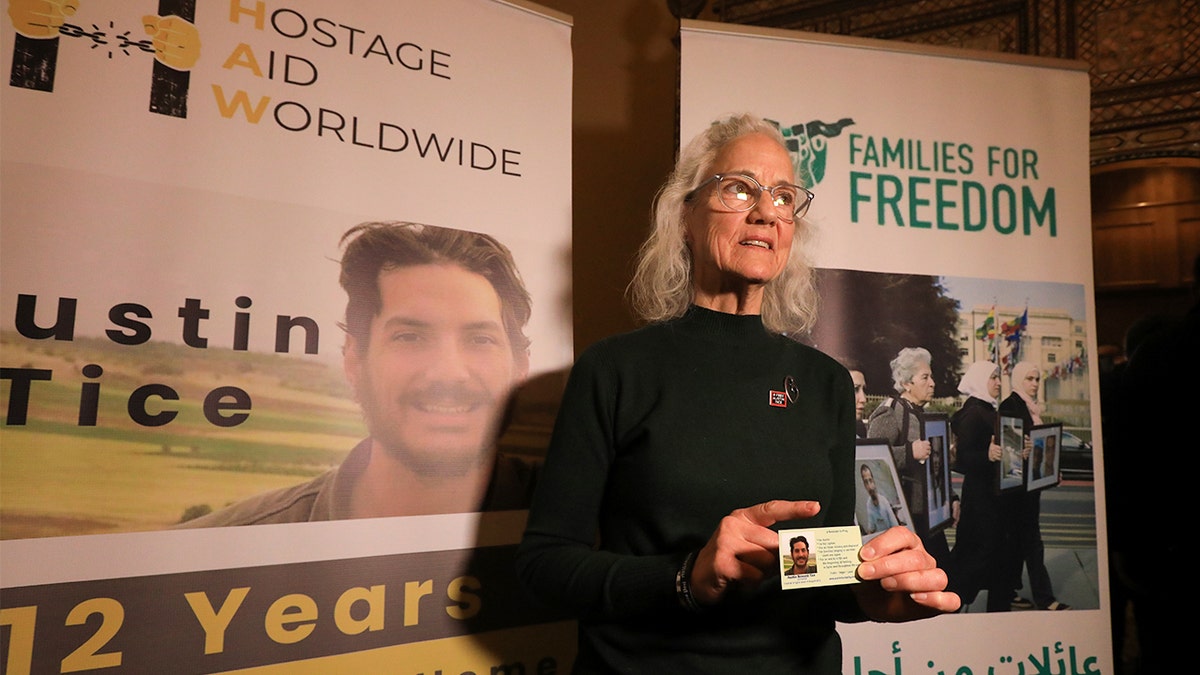INTERNACIONAL
Mother of missing Marine veteran calls Trump admin a ‘breath of fresh air’ as she continues 12-year search

Debra Tice has spent more than 12 years searching for her son, Austin Tice, a Marine veteran and journalist who was kidnapped in Syria in August 2012. Through four presidential administrations, she has not lost hope that her son will come home alive. In fact, she calls the new Trump administration a «breath of fresh air.»
«They are thinking about what they need to do, making suggestions, standing ready, having ideas. The burden isn’t on me the way it has been in the past,» Tice told Fox News Digital, referring to the Trump administration.
The Marine veteran’s mother’s first trip back to Damascus, Syria, in over 10 years comes on the heels of a revolution within the war-torn country. Debra Tice has been in Syra for only a few days, but has already managed to meet with the country’s de facto leader, Ahmed al-Sharaa, who led the group that overthrew Bashar al-Assad.
«It was really quite a surprise that we were able to get a meeting with al-Sharaa. It was a very good meeting,» Tice said.
SYRIA RESCUE-MISSION OPERATOR BELIEVES AUSTIN TICE IS ALIVE AND WILL BE FOUND SOON
In this photo released by Syrian state news agency SANA, Syria’s de facto leader Ahmad al-Sharaa, right, meets with Debra Tice, the mother of American journalist Austin Tice, who went missing in Syria in 2012, left, and Nizar Zakka, head of non-profit Hostage Aid Worldwide, center, in Damascus, Syria, Monday, Jan. 20, 2025. (SANA via AP)
Hostage Aid Worldwide, a non-profit organization coordinating Tice’s visit to Syria, was able to take her inside some of the prisons that have been abandoned since the fall of Assad. She said that seeing the conditions in these prisons was «really challenging,» but that she appreciated getting a sense of «what Austin was up against.»
Tice also issued a challenge to those in the US government who «feel like Austin can wait» to go see the prisons for themselves.
«I think if they had to come over here – and I wouldn’t even ask them to spend the night in one of those prisons – but I think if they had gone to see what he may have gone through, maybe they would’ve been more motivated to get Austin out of there.»
TREY YINGST ENTERS ABANDONED SYRIAN DETENTION SITE IN SEARCH FOR MISSING AMERICAN JOURNALIST AUSTIN TICE

Debra Tice, mother of missing U.S. journalist Austin Tice who disappeared while reporting in Syria in August 2012, attends a press conference as she urged President Donald Trump to help reveal her son’s fate in Damascus, Syria on Jan. 20, 2025. (Bekir Kasim/Anadolu via Getty Images)
During a press conference on Monday, Tice offered praise for the incoming Trump administration and confirmed that they «already reached out» regarding Austin’s case.
«I haven’t experienced that in the past four years, but I am optimistic about their help and involvement. I believe they will act quickly,» Tice said.
Tice also used the press conference to send an emotional message to her missing son.
«Austin, if you can hear this somehow, I love you. I know you won’t give up, and I won’t give up either,» Tice said.
Tice says she has «never had any doubt about the fact that Austin is going to walk free. It’s a matter of time, and in my faith it’s God’s timing.
When speaking about her hope and optimism about finding her son, Tice credited her faith «one hundred per cent.» She added that, «if I didn’t have my faith, I just think I would crumble into a bunch of really small pieces.»
COLLAPSE OF SYRIA’S ASSAD REGIME RENEWS US PUSH TO FIND AUSTIN TICE

The State Department’s Reward for Justice program is offering $10 million for information relating to locating Austin Tice. 12/9/2024 (The State Department’s Reward for Justice)
A State Department spokesperson told Fox News Digital that «intensive efforts are still underway to find Austin Tice.» Additionally, the spokesperson said that the department is «working to get US officials into Damascus» to aid in the search, but is waiting for confirmation that the»conditions are safe and local authorities can accommodate the visit.»
«We have used relevant information, as well as declassified intelligence, to inform the search efforts of Syrian and international partners on the ground in Damascus who are searching for Austin every day,» the spokesperson added.
«They have visited and searched numerous now-uncovered secret prisons, but to date they have not found Austin or any additional information that would help us locate him.»
CLICK HERE TO GET THE FOX NEWS APP
Last month, after receiving a letter from Debra Tice, Russian President Vladimir Putin promised to ask Assad for help finding Austin. However, as of now, there are no signs that this has happened.
INTERNACIONAL
Guerra de guerrillas y 100 muertos en tres días: la violencia en Colombia derrumba la «paz total» de Gustavo Petro

Choques sangrientos en el Catatumbo
Cocaína y narcocultivos
-
POLITICA2 días ago
El discurso completo de la toma de posesión de Donald Trump en español
-
POLITICA2 días ago
OPNyA: Video expone graves violaciones a los derechos humanos en el gobierno de Axel Kicillof
-
ECONOMIA3 días ago
Acciones, bonos, Bitcoin o dólar: en qué recomienda invertir la City con Trump presidente de los EE.UU.
-
INTERNACIONAL2 días ago
El bitcoin alcanza nuevo récord por encima de los 109.000 dólares antes de la toma de posesión de Trump
-
POLITICA3 días ago
Se tensa la pelea entre los intendentes del PJ y Luis Caputo: le piden que saque el 12% del impuesto a los combustibles a cambio de eliminar la tasa vial
-
POLITICA16 horas ago
Corrupción: Axel Kicillof y una sospechosa licitación de 4.000 millones de pesos






























